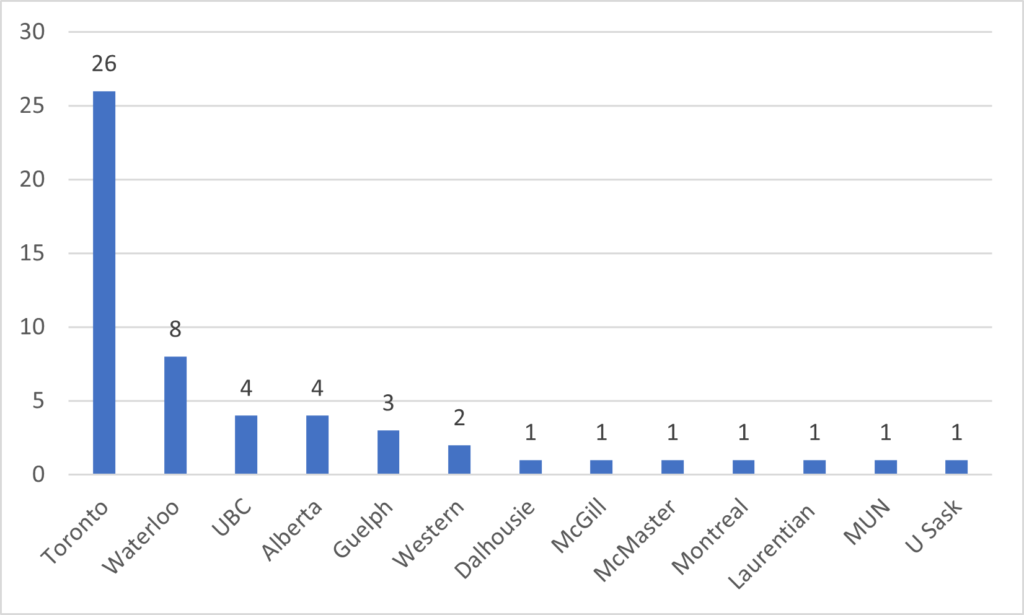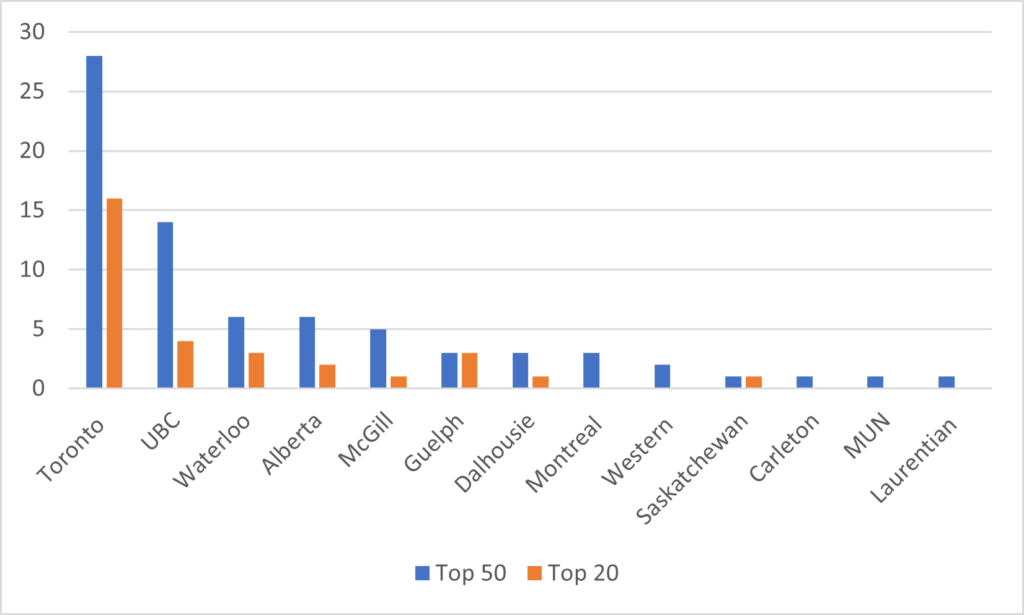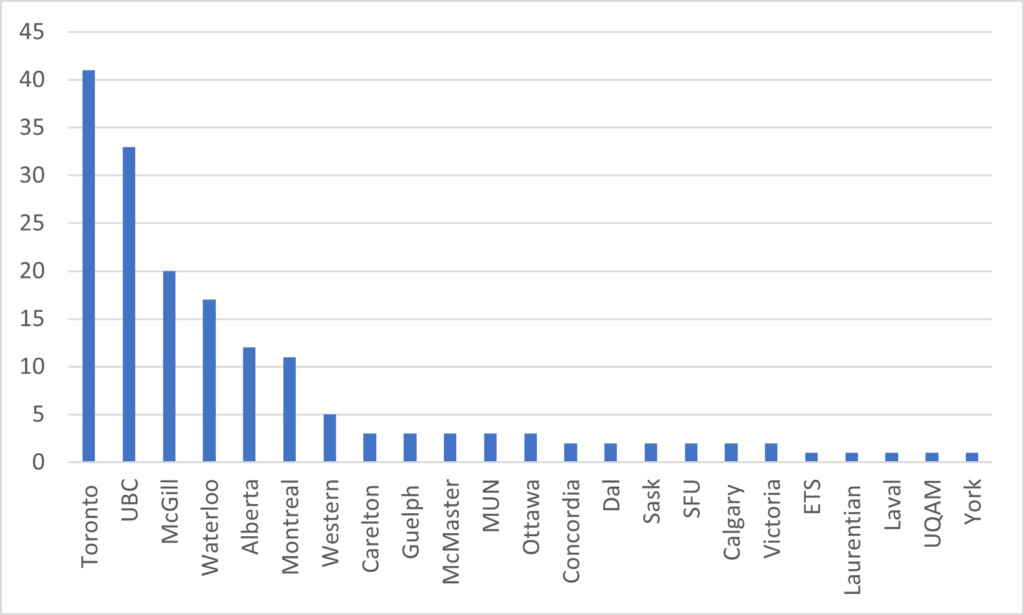It’s been awhile since I’ve looked at Global Rankings in any depth, so this week I am going to take a look at three sets of rankings which are either had notable methodological changes or contain data that is of particular interest to Canadians.
I’ll start with the Shanghai Rankings. Not the Academic Rankings of World Universities, which is a bit boring from a Canadian point of view. Nothing ever changes much on that front because ARWU, by design, is meant to avoid producing significant annual fluctuations: Canada is neither losing ground on the world stage like the US, nor gaining ground like Australia, and our top institutions are always Toronto, UBC, McGil, McMaster and Alberta. Boring. Nothing to talk about. Rather, what I would like to draw attention to is the ShanghaiRanking’s Global Ranking of Academic Subjects, which I think tell a much more nuanced and interesting story.
First, I need to clear up some things about how subject rankings are calculated. As with the institutional rankings, it’s mainly a measure of elite publications and scholarly awards. The main difference is that the subject rankings actually have a measure that looks at citation impact. The indicators are the same across all subjects, but the weighting varies a bit. (you can see the full methodology and list of subjects here). The 55 subjects are a bit arbitrary (and because it’s a Chinese ranking, it’s heavily geared towards Engineering, which is divided into 23 subjects while Life Sciences has just 4), but it’s still understandable and defensible.
Two key points: first, these are subject rankings and not departmental or faculty rankings, and subjects are determined not by the identity of the scholar but by the journals in which articles are published. So, for instance, a Psychology Professor who publishes articles in a journal on neuroeconomics will see the “points” for that article accrue to Economics at University X, not Psychology at University X. Second, the journal is measuring institutional strength in a subject by author affiliation. That is, if a paper author lists a university or a recognized affiliated organization (e.g. a hospital with an academic link to a university) on the article, that university gets the “points” for the article. Doesn’t matter if that person is an employee or not. Grad students count. Research staff at hospitals count. Conversely, if you recently hired a superstar faculty member from another university, their previous publications stay with their previous university because that’s the affiliation listed on the article. Bibliometrics does not care who you are: it’s all about affiliations in articles and classification of journals.
Got all that? OK, then let’s start by looking at how the Subject Rankings rank Canadian institutions against one another. Figure 1 shows which the number of subjects in which various universities as the “top” in Canada. And as you can see, the University of Toronto is far and away the leader, considered by this ranking to mean the top institution in 26 of 55 subjects. Basically, Toronto runs the table in Medical Sciences and most of the Social Sciences. Alberta, Waterloo and UBC mainly show top up in STEM subjects and good on Laurentian for grabbing top spot in Mining Engineering (note: the totals here add up to 54: Canada does not have any ranked institution in the field of Textile Science and Engineering).
Figure 1: Number of Top-ranked Subjects, by University, Shanghai Rankings Global Ranking of Academic Subjects, Canada, 2023

Turning to comparisons of Canadian universities against the rest of the world, there are only a handful of Canadian institutions which rank in the global top ten. Six of these are at the University of Toronto: Psychology, which is ranked third in the world overall, Sociology and Pharmacy (both 6th), and Public Health, Medical Technology and Education (all 8th). UBC has two subjects in the top ten (Telecommunications Engineering at 7th, Ecology at 9th), while University of Alberta ranks 8th in the world in Instrument Science. If you expand the focus to the world’s top 20 or 50, as I do below in Figure 2, you get a similar story: The number of institutions which have subjects ranked above a given threshold rises, but the distance between U of T and the rest of the country’s universities stays similar.
Figure 2: Distribution of Global Top-50 and Top-20 programs by University, Shanghai Rankings Global Ranking of Academic Subjects, Canada, 2023

If you extend the lens out to programs that make a global top 100 in one field or other, you get a slightly different picture. No fewer than 23 Canadian universities have at least one program making the top century; U of T is again the runaway leader, but UBC is at least in the ballpark in the way it is not if you restrict the analysis to the top 50 or 20.
Figure 3: Distribution of Global Top-100 programs by University, Shanghai Rankings Global Ranking of Academic Subjects, Canada, 2023

In terms of where Canadian universities collectively show strength, you can analyze the data a few different ways. Below in Table 1, I note subjects where i) Canada has more than one institution in the top 20, ii) Canada has five or more institutions in the top 100, and iii) where Canada has more than 5% of the ranked institutions in a subject (about half of the subjects in this ranking contain 500 ranked institutions, but the average is 350 and some have as few as 50: hence the need to normalize). The two fields that meet all these tests are Environmental Science, and Transportation Science/Engineering. Another five meet two of the tests and eleven more meet at least one of them.
Table 1: Fields of Collective Excellence for Canadian University.
| Field | 2 in Top 20 | 5+ in top 100 | 5% of ranked institutions |
|---|---|---|---|
| Environmental Science | X | X | X |
| Transportation Science/Engineering | X | X | X |
| Geography | X | X | |
| Ecology | X | X | |
| Oceanography | X | X | |
| Telecom Engineering | X | X | |
| Library/Information Science | X | X | |
| Public Health | X | ||
| Medical Technology | X | ||
| Statistics | X | ||
| Clinical Medicine | X | ||
| Atmospheric Science | X | ||
| Electrical Engineering | X | ||
| Computer Science and Engineering | X | ||
| Mining and Mineral Engineering | X | ||
| Law | X | ||
| Political Science | X | ||
| Psychology | X |
What all this tells us implicitly are two things. First, excellence is reasonably widely spread in Canada. But also: we’re really all that not into specialization. The result that really caught my eye was McMaster. This university has consistently placed in the top 100 in the world over the past decade (98th in 2023), and it achieves this without having any subjects in the top 50 and only 3 in the top 100. Now, I know the methodologies of the university and subject rankings aren’t quite the same, but they are close enough that this is still remarkable. The only way this result makes sense is that McMaster is above-average in an awful lot of what it does: not good enough to make the top 100, necessarily, but collectively good enough to lift the institutional profile into a global elite (this is deeply ironic, since as I noted back here, McMaster is the one Canadian university which really took the “steeples of excellence” model to heart). Not all Canadian universities look like McMaster, but our collective result seems to fit the same pattern: no surfeit of world-beaters, but a lot pretty-goods.
Is this a good result? A bad one? It’s really in the eye of the beholder.
Tomorrow: The THE Impact Rankings.

 Tweet this post
Tweet this post
